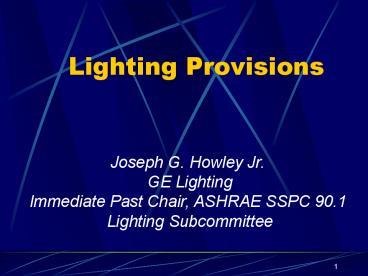Lighting Provisions - PowerPoint PPT Presentation
1 / 18
Title:
Lighting Provisions
Description:
Most exterior power requirements replaced with minimum efficacy ... Building grounds lamps 100W = efficacy of 60 LPW (unless controlled by a motion sensor) ... – PowerPoint PPT presentation
Number of Views:69
Avg rating:3.0/5.0
Title: Lighting Provisions
1
Lighting Provisions
Joseph G. Howley Jr. GE Lighting Immediate Past
Chair, ASHRAE SSPC 90.1 Lighting Subcommittee
2
1989 vs. 1999
- Control credits are eliminated
- Control points are no longer used
- Most exterior power requirements replaced with
minimum efficacy (lumens/watt) requirements
3
1989 vs. 1999 (Contd)
- Interior Power requirements updated
- Requirements more stringent
- No more area factor calculations
- No more building size dependencies
4
Section 9
- 9.1 General Application
- 9.2 Mandatory Provisions
- 9.3 Prescriptive Path
- Interior Lighting Power Allowance
- Building Area Method
- Space by Space Method
- Exterior Lighting Power Allowance
5
Section 9.1 General Application
- Interior spaces of buildings
- Exterior building features
- Exterior grounds lighting powered through the
building
6
Section 9.1 General Application (Contd)
- Exceptions
- Emergency lighting
- Lighting required by life safety statute
- Lighting within living units of buildings
- Decorative gas lighting
7
Lighting Alterations to Existing Buildings
- Replacement systems - comply with power density
and control requirements - Exception Alterations that replace lt 50 of the
luminaires in a space
8
Section 9.2 Mandatory Provisions Interior
Controls
- Automatic Lighting Shutoff
- Programmable Whole Building Controller
- Occupancy Sensors/Other
- Allow occupant Intervention
- Additional Separate Controls
Accent, Case, Task, Hotel Room, Non-visual,
Demonstration
9
Section 9.2.2 Tandem Wiring
10
Tandem WiringExceptions
- Separated Surface or pendant luminaires
- Recessed luminaires more than 10 ft apart
- Other luminaires
- With three-lamp ballasts
- On emergency lighting circuits
- With no available pair
- With one-lamp, high frequency, electronic ballast
11
Section 9.2.3 Exit Signs
- Exit signs operating at greater than 20 watts
shall have a minimum source efficacy of 35 lumens
per watt
12
Section 9.2.5 Luminaire Wattage
- Standard incandescent max. labeled wattage of
the luminaire - Luminaires with ballasts wattage of the
lamp/ballast combination - Line voltage track min. 30 W per foot
- Low voltage track transformer wattage
- All others as specified
13
Lighting Power Development Concept
- Create Building Space Models to calculate power
densities with - Current product performance data
- Updated efficacy and loss factors
- New building construction data
- IES recommended light levels
- Professional lighting design consensus
14
Building Area MethodLighting Power Densities
- Hospital - 1.6 W/ft2
- Library - 1.5 W/ft2
- Manufacturing - 2.2 W/ft2
- Museum - 1.6 W/ft2
- Office - 1.3 W/ft2
- Parking Garage - 0.3 W/ft2
- Retail - 1.9 W/ft2
- School - 1.5 W/ft2
15
Space by SpaceLighting Power Allowance
- Office Building
- Office Enclosed - 1.5 W/ft2
- Office Open - 1.3 W/ft2
- Conference - 1.5 W/ft2
- Training - 1.6 W/ft2
- Lobby - 1.8 W/ft2
- Lounge - 1.4 W/ft2
- Dining - 1.4 W/ft2
- Food Prep - 2.2 W/ft2
- Corridor - 0.7 W/ft2
- Restroom - 1.0 W/ft2
- Active Storage - 1.1 W/ft2
16
Section 9.3.1.2.1 Additional Interior Lighting
Power
- Decorative - 1.0 W/ft2 in space used
- Fluorescent designed to eliminate screen glare
(IES RP1) - 0.35 W/ft2 - Accent Lighting in specific space used
- Additional 1.6 W/ft2 , or
- Additional 3.9 W/ft2 for fine merchandise
17
Exterior Controls/Building Grounds Lighting
- Automatic shutoff when sufficient daylight is
available - Photosensor
- Time switch
- Building grounds lamps gt 100W efficacy of 60
LPW (unless controlled by a motion sensor)
18
Section 9.3.2 Exterior Building Lighting Power
- Building Surface Requirements
- Building Entrance w/canopy - 3W/ft2
- Building Entrance - 33 W/linear ft
- Building Exit - 20 W/linear ft
- Building Façades - 0.25 W/ft2































